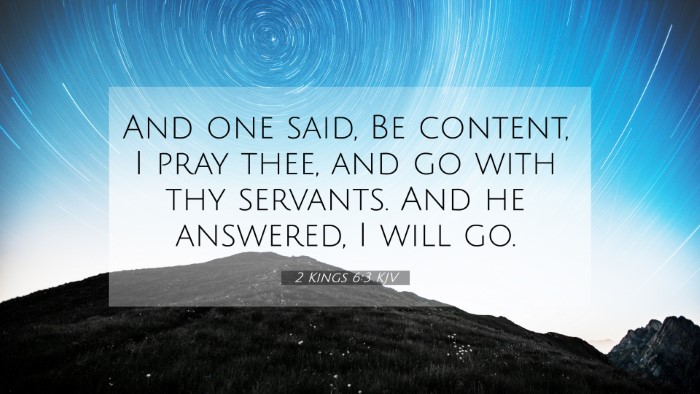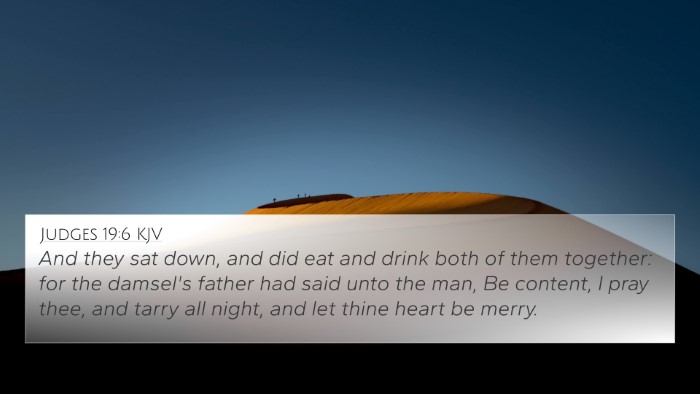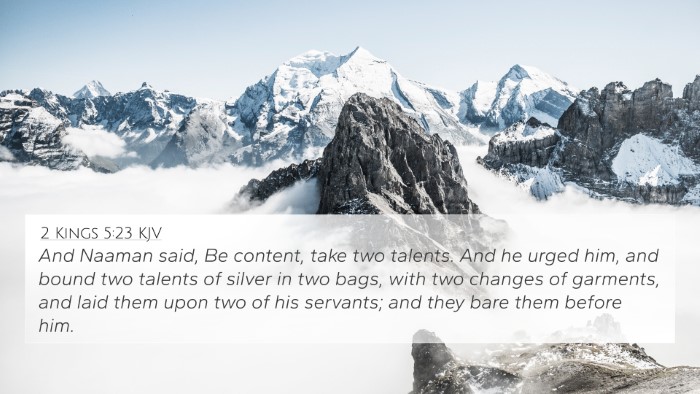Understanding 2 Kings 6:3
Verse: "And one said, Be content, I pray thee, and go with thy servants. And he answered, I will go." (2 Kings 6:3, KJV)
Summary of Meaning
This verse occurs in the context of Elisha's prophetic ministry, where the sons of the prophets request him to join them as they build a new place for themselves near the Jordan River. It illustrates not only the communal aspect of prophetic work but also Elisha's willingness to support this endeavor. The invitation to accompany the workmen signifies unity and collaboration in carrying out God's mission.
Commentary Insights
- Matthew Henry: Henry emphasizes the importance of community among believers. He suggests that the work of the ministry thrives in fellowship and shared purpose. Elisha’s willingness to accompany the sons shows his leadership and commitment to their collective goal.
- Albert Barnes: Barnes points out that the verse reflects the humility and readiness to serve found in Elisha. He notes that the invitation from the young prophets indicates their reliance on Elisha's guidance and support, highlighting the importance of mentorship in spiritual matters.
- Adam Clarke: Clarke interprets this verse as illustrating the spirit of cooperation in the ministry. He remarks on how the desire for Elisha's presence indicates the respect and admiration they held for him, which serves to enhance their undertaking of building a place dedicated to God.
Cross-References
This verse connects with several other scripture passages that enhance its meaning and context:
- 2 Kings 2:3: This verse highlights the prophetic community surrounding Elijah and Elisha, establishing a precedent for Elisha's role as a mentor.
- 1 Thessalonians 5:11: "Therefore encourage one another and build each other up, just as in fact you are doing." This verse underscores the importance of support and encouragement among believers, akin to the request made to Elisha.
- Hebrews 10:24-25: This speaks to the need for mutual encouragement and gathering together as believers, resonating with the spirit of cooperation seen in 2 Kings 6:3.
- Acts 15:2: This verse illustrates how early church leaders worked collaboratively, similar to the communal effort of the sons of the prophets.
- Proverbs 27:17: "Iron sharpens iron, and one man sharpens another." This metaphor speaks to the benefits of fellowship and interaction, akin to the social and spiritual encouragement of Elisha’s involvement.
- Colossians 3:16: This emphasizes teaching and admonishing one another in wisdom, reflecting the community dynamic established in 2 Kings.
- Ephesians 4:16: This verse reinforces the theme of unity and support within the Body of Christ, paralleling the community led by Elisha.
Thematic Bible Verse Connections
The themes of mentorship, community, and service prominent in this verse resonate throughout scripture. The connection between prophet and followers is a critical motif in both the Old and New Testaments, exemplifying God's design for relational ministry.
- Mentorship and Leadership: Similar to 2 Kings 6:3, many biblical leaders, such as Moses and Joshua (Exodus 17:9-10), demonstrate the significance of a mentor in guiding and supporting new leaders.
- Community Efforts: In Nehemiah 4:6, the people unite to rebuild the wall of Jerusalem, showcasing collective effort and God's call to work together.
- Reliance on Divine Guidance: Proverbs 3:6 reminds believers to acknowledge God in their ways, much like how the sons of prophets acknowledged Elisha's guidance.
Application for Today
In a modern context, this verse challenges us to consider how we foster community and collaboration in faith. The communal building of the prophets models how we ought to invite spiritual leaders into our initiatives and how we can support one another in our spiritual journeys.
Tools for Bible Cross-Referencing
Using a Bible concordance or a true cross-reference Bible study system can help delve deeper into such connections. These tools allow you to find related verses, understand detailed themes, and explore how scriptures from the Old and New Testaments dialogue with each other.
In conclusion, 2 Kings 6:3 is rich in themes of community, guidance, and collective action in faith, providing numerous points for further exploration through comparative Bible verse analysis.






